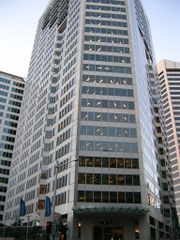PricewaterhouseCoopers
| Type | Member firms have different legal structure, but both UK and US have a Limited Liability Partnership |
|---|---|
| Industry | Professional Services |
| Founded | 1849, London (in 1998, firm took on current name) |
| Headquarters | London, United Kingdom [1] |
| Area served | Worldwide |
| Key people | Dennis Nally (Senior Partner)[2] |
| Products | Assurance Tax Advisory Consulting Financial Advisory Actuarial Legal |
| Revenue | |
| Employees | 165,000[4] |
| Website | PwC.com |

PricewaterhouseCoopers (or PwC) is one of the world's largest professional services firms and the largest of the Big Four auditing firms. It was formed in 1998 from a merger between Price Waterhouse and Coopers & Lybrand, both formed in London.[5]
PricewaterhouseCoopers earned aggregated worldwide revenues of US$26.2 billion[6] for the fiscal year 2009, and employed over 163,000 people[6] in 151 countries.[6]
In the United States, where in 2009 it was the eighth largest privately owned organization, it operates as PricewaterhouseCoopers LLP.[7]
PricewaterhouseCoopers is a Big Four auditor, alongside KPMG, Ernst & Young and Deloitte Touche Tohmatsu.
Contents |
History
The firm was created by the merger of two large firms, Price Waterhouse and Coopers & Lybrand in 1998. These two firms each have histories dating back to the nineteenth century.
Price Waterhouse
Samuel Lowell Price, an accountant, started his practice in London in 1849.[8] In 1865 Price went into partnership with William Hopkins Holyland and Edwin Waterhouse. Holyland left shortly after to work alone in accountancy and the firm was known from 1874 as Price, Waterhouse & Co.[8] (The comma was dropped from the name much later.) The original partnership agreement, signed by Price, Holyland and Waterhouse could be found in Southwark Towers, one of PwC's important legacy offices (now under demolition) in London.
By the late nineteenth century, Price Waterhouse had gained significant recognition as an accounting firm. As a result of trade between the United Kingdom and the United States of America, Price Waterhouse opened an office in New York in 1890,[8] and the American firm itself soon expanded rapidly. The original British firm opened an office in Liverpool in 1904[8] and then elsewhere in the United Kingdom and countries abroad, each time establishing a separate partnership in each country: the worldwide practice of PW was therefore a federation of collaborating firms that had grown organically rather than being the result of an international merger.[8]
In a further effort to take advantage of economies of scale, PW and Arthur Andersen had discussed a merger in 1989[9] but the negotiations failed mainly because of conflicts of interest such as Andersen's strong commercial links with IBM and PW's audit of IBM.
Coopers & Lybrand
In 1854 William Cooper established his own practice in London, which became Cooper Brothers seven years later when his three brothers joined.[10]
In the USA in 1898, Robert H. Montgomery, William M. Lybrand, Adam A. Ross Jr. and his brother T. Edward Ross formed Lybrand, Ross Brothers and Montgomery.[5] Coopers & Lybrand is the result of a merger in 1957 between Cooper Brothers & Co; Lybrand, Ross Bros & Montgomery and a Canadian firm McDonald, Currie and Co.[5] In 1990 in certain countries including the UK Coopers & Lybrand merged with Deloitte Haskins & Sells to become Coopers & Lybrand Deloitte,[5] in 1992 renamed Coopers & Lybrand.[11]
The merger
In 1998, Price Waterhouse merged with Coopers & Lybrand to form PricewaterhouseCoopers (written with a lowercase 'w') in an attempt to gain a scale that would put the new firm in a different league.[12]
Recent history
By the late 1980s the firm had created a large professional consulting branch, as did other major accountancy firms, generating much of its fees. Management Consulting Services (MCS) was the fastest growing and often most profitable area of the practice, though it was cyclical. The major cause for growth in the Nineties was the implementation of complex integrated ERP systems for multi-national companies.
However, PwC came under increasing pressure to avoid conflicts of interests by not providing consulting services to its audit clients. Since it audited a large proportion of the world's largest companies, this was beginning to limit its potential market. These conflicts were going to increase when additional services such as the outsourcing of ERP systems were offered. For these reasons, in 2000, Ernst & Young was the first of the Big Four to sell its consulting services, to Capgemini.[13]
PwC therefore planned to capitalize on MCS's rapid growth through its sale to Hewlett Packard (for a reported $17 billion) but negotiations broke down in 2000.[14]
PwC announced in May 2002 that its consulting activities would be spun off as an independent entity. An outside consultancy, Wolff Olins, was hired to create a brand image for the new entity, called "Monday" [15]. The firm's CEO, Greg Brenneman described the unusual name as "a real word, concise, recognizable, global and the right fit for a company that works hard to deliver results."[16] These plans were soon revised, however. In October 2002, PricewaterhouseCoopers sold the entire consultancy business to IBM for approximately $3.9 billion in cash and stock. PwC's consultancy business was absorbed into IBM Global Business Services, increasing the size and capabilities of IBM's growing consulting practice.[17]
Global structure
The legal structure of a limited liability partnership [LLP] is very different to that of a company, and as such the global firm is in fact a collection of member firms, that are run autonomously in their respective jurisdictions. The senior partners of member firms sit on a global board of partners and there is also an 'umbrella' organisation called PricewaterhouseCoopers International Limited, a UK[18]-based company which provides co-ordination. Dennis Nally, the former Chairman of the US firm, became Chairman of PwC International on July 1, 2009.[2]
Services
Global
PricewaterhouseCoopers has three main service lines:[19]
- Assurance Services,
- Tax Advisory, (international tax planning and compliance with local tax laws, human resource consulting, and transfer pricing)
- Advisory - mainly consulting activities which covers Strategy, Performance Improvement, Transactions Services, Business Recovery Services, Corporate Finance, Business Valuation, and Crisis Management in a range of specialist areas such as accountancy and actuarial advisory.
PwC's service lines face the market in each country by broad industry specialisations such as:
- Consumer and Industrial Products and Service (CIPS),[20]
- Financial Services (FS),[21]
- Technology, Information, Communications and Entertainment (TICE),[22]
- Infrastructure, Government and Utilities (IG&U)[23]
These sub-divisions may vary slightly in some territories.
Consulting activities
PwC has developed several broader consulting initiatives in the Enterprise Risk Management (ERM) framework, including a global effort to assist corporations with outsourcing, as well as a global political risk assessment with the political risk advisory firm Eurasia Group.[24]
Advisory services offered by PwC also include two actuarial consultancy departments; Actuarial and Insurance Management Solutions (AIMS) and a sub branch of "Human Resource Services" (HRS). Actuarial covers mainly 4 areas: pensions, life insurance, non-life insurance and investments. AIMS deals with life and non-life insurance and investments while HRS deals mainly with pensions.[25]
PwC serves the U.S. Federal Government through their Public Sector practice. PwC has over 2000 professionals based in the Washington Metro Corridor.[26]

Major clients
Europe and North America account for about 81% of PwC's annual revenue,[27] with Europe alone accounting for 45%.[27] The firm's dominant practice, auditing, accounts for over 50% of PwC's revenue.[19]
As of March 2005, PricewaterhouseCoopers' audit clients included four of the 10 largest public companies in the United States (ExxonMobil, Ford Motor Company, ChevronTexaco and IBM). PwC also audits four of the 10 largest companies in the United Kingdom (GlaxoSmithKline, Royal Dutch Shell, Barclays and Lloyds TSB).
One client, the Academy of Motion Picture Arts and Sciences, gives PwC the unique distinction of having been (in various incarnations) the tabulator and certifier of votes for the Academy Awards since 1934.[28]
PwC audits 40 per cent of companies in the FTSE 100 Index[29] and 45 per cent of the Fortune 1000 energy companies.[30]
PwC also tabulates the Oscar winners for the Academy Awards.[31]
The following are PwC audit clients that are part of the FT Global 500 (2006), grouped by FT industry:
- Aerospace & defence: Raytheon, United Technologies, L-3 Communications Corporation
- Automobiles & parts: Goodyear, Toyota Motor, Volkswagen, Peugeot, Robert Bosch GmbH, Ford, Maruti Suzuki
- Banks: Absa, Afghanistan International Bank, Askari Bank, Bank of America, Bank of China (Hong Kong), Bank of Ireland, Banco Itau, Banco Popular Español, Barclays, Commonwealth Bank, Crédit Agricole, BB&T, BNP Paribas, Banco Bradesco, Commerzbank, Dexia, DnB NOR, Eurobank EFG, Fortis, Goldman Sachs, JP Morgan Chase, Lloyds TSB, Nationwide Building Society, Macquarie Bank, Sanpaolo IMI, SEB, Standard Bank, Westpac Banking Corporation
- Beverages: Anheuser-Busch, Miller, SAB, United Breweries
- Chemicals: Albemarle, Bayer, E.I. du Pont de Nemours, Praxair, Rohm & Haas
- Electricity: RAO UES, Chubu Electric Power, FirstEnergy, Exelon, Unified Energy System, ATCO
- Electronic & electrical equipment: Agilent Technologies, Kyocera, LG Philips LCD, Logitech
- Fixed line telecommunications: BellSouth, BT Group, Etisalat, KPN, Nippon
- Food & drug retailers: Krispy Kreme, Seven & I Holdings Co., Tesco
- Food producers: Danone, Kellogg's, Kraft Foods, Unilever, Bunge
- Gas, water & multiutilities: Centrica, E.ON, RWE, National Grid plc

- General financial: American Express, Freddie Mac, Franklin Resources, Goldman Sachs, Nikko Cordial, SLM, Fidelity Investments
- General industrials: 3M, Honeywell International, Hutchison Whampoa
- General retailers: eBay, GUS, Marks & Spencer, John Lewis Partnership
- Healthcare equipment & services: Baxter International, HealthSouth Corporation, Medco Health Solutions, Medtronic, Zimmer Holdings, Southern Cross Healthcare
- Household goods: Reckitt Benckiser
- Industrial engineering: Caterpillar Inc., Volvo, JCB
- Industrial metals: Alcan, Alcoa, Nippon Steel, Nucor, POSCO, Tenaris
- Industrial transportation: Burlington Northern Santa Fe Corp., Deutsche Post
- Insurance: ACE Limited, American International Group, AMB Generali, AXA, Legal & General, Liverpool Victoria, Millea Holdings, Progressive Corporation, Protective Life Corporation, Prudential Financial, Standard Life, Swiss Re, Zurich Financial Services
- Leisure goods: Nintendo
- Media: CBS, CTVglobemedia, Thomson, Viacom, Walt Disney, Pearson
- Mining: Barrick Gold, Harmony Gold, Impala Platinum, Newmont Mining, Rio Tinto, Vale
- Mobile telecommunications: Alltel, KDDI, MTN Group, Sonera, Telia, China Unicom,
- Oil & gas producers: BG, Burlington Resources, Canadian Natural Resources Limited, Exxon Mobil, Chevron, EnCana Corporation, Eni, Gazprom, Imperial Oil, Suncor Energy, Marathon Oil, Royal Dutch Shell, Shell Canada, Attock Petroleum Limited
- Oil equipment & services: Schlumberger
- Personal goods: Colgate-Palmolive, L'Oréal, Nike, Richemont
- Pharmaceuticals & biotechnology: Bayer, Biogen Idec, Bristol-Myers-Squibb, Genzyme, GlaxoSmithKline, Johnson & Johnson, Merck & Co., Novartis, Novo Nordisk, Sanofi-Aventis, Teva Pharmaceutical Industries, Wyeth
- Retail: Abercrombie & Fitch, Dollarama
- Software & computer services: IBM, Yahoo!
- Sports: Laureus World Sports Awards
- Technology hardware & equipment: Cisco Systems, Corning Inc., Dell, EMC Corporation, Ericsson, Hon Hai Precision Industry, Nokia, Qualcomm, Samsung Electronics, STMicroelectronics, BMC Software
- Telegraph and Telephone: PT. Telekomunikasi Indonesia Tbk., Saudi Telecom
- Tobacco: Altria, British American Tobacco, Imperial Tobacco, ITC, Philip Morris International
- Travel & leisure: Carnival, Las Vegas Sands, SKYCITY Entertainment Group
Name and branding
The firm's name arose from the merger of Price Waterhouse and Coopers & Lybrand in 1998.
Staff
Because PricewaterhouseCoopers' only product is the output of its employees, the firm has a competitive recruiting program. PricewaterhouseCoopers was recently included in Fortune's "100 Best Companies to Work For" list, coming in at number 58 in 2009.[32] In the UK the company has been voted number one in the Times Top 100 Graduate Employers for 6 consecutive years.[33] PricewaterhouseCoopers is one of the top 10 companies for working mothers.[34] Training is also a top priority, and in 2010 PwC captured top honors on Training Magazine's "Top 125" list for the third consecutive year, becoming the first company ever to achieve a "three-peat."[35] In October 2008, PricewaterhouseCoopers was named one of "Canada's Top 100 Employers" by Mediacorp Canada Inc., and was featured in Maclean's newsmagazine. Later that month, PricewaterhouseCoopers was also named one of Greater Toronto's Top Employers, which was announced by the Toronto Star newspaper.[36] PricewaterhouseCoopers in Ireland was named as the winner of the Best Company to Work for in Ireland 2008 by the Great Place to Work Institute in their annual list of Ireland's top employers.[37]
Criticisms
ChuoAoyama Suspension
From 2000 to 2006, PwC's affiliate of assurance service in Japan was ChuoAoyama Audit Corporation (中央青山監査法人 Chūō-Aoyama Kansa Hōjin). In May 2006, the Financial Services Agency suspended ChuoAoyama following a suspicious audit of cosmetics company Kanebo in which three of the firm's partners allegedly assisted with accounting fraud and boosted earnings for the company by about $1.9 billion over the course of five years. The accountants involved were reprimanded by the Tokyo District Court but escaped prison time after a judge deemed them to have played a "passive role" in the crime.[38]
Shortly after the suspension of ChuoAoyama (中央青山監査法人), PwC acted quickly to stem any possible client attrition as a result of the scandal. It set up the PricewaterhouseCoopers Aarata, and some of ChuoAoyama's accountants (but most of the international divisions) moved to the new firm. ChuoAoyama resumed operations on September 1 under the Misuzu name. However, by this point the two firms combined had 30% fewer clients than did ChuoAoyama prior to its suspension.[39]
Misuzu dissolved in July, 2007.
Tyco settlement
In July 2007, PwC agreed to pay $229 million to settle a class-action lawsuit brought by shareholders of Tyco International Ltd. over a multibillion-dollar accounting fraud.[40]
Satyam case
In January 2009 PwC was criticised,[41][42][43][44][45][46] along with the promoters of Satyam, an Indian IT firm listed on the NYSE, in a $1.5 billion fraud.[47] PwC has written a letter to the board of directors of Satyam that its audit may be rendered "inaccurate and unreliable" due to the disclosures made by Satyam's (ex) Chairman.[48] PwC's U.S. arm "was the reviewer for the U.S. filings for Satyam."[49] Consequently, lawsuits have been filed in the U.S. with PwC as a defendant.[50] Two partners of PricewaterhouseCoopers, Srinivas Talluri and Subramani Gopalakrishnan, have been charged by India’s Central Bureau of Investigation in connection with the Satyam scandal. Since the scandal broke out, Subramani Gopalakrishnan retired from the firm after reaching mandatory retirement age; while Talluri remains on suspension from the firm.[51]
Other punishments and criticisms
India's accounting standards agency ICAI is investigating partners of PwC for professional negligence[42] in the now-defunct Global Trust Bank Ltd. case of 2007. Like Satyam, Global Trust Bank was also based in Hyderabad. This led to Reserve Bank of India banning PwC from auditing any financial company for over a year.[52][53][54] PwC was also associated with the accounting scandal at DSQ Software[55] in India. In July 2006, PwC’s Japanese affiliate Chuo Aoyama was handed a two-month ban.[42] Following the Satyam scandal, the Mumbai-based Small Investor Grievances Association (SIGA) has requested the Indian stock market regulator SEBI to ban PwC permanently and seize its assets in India alleging few more scandals like "Ketan Parekh stock manipulations."[56] The Accountancy and Actuarial Discipline Board, which regulates the profession in the UK, announced an inquiry in July 2009 into PwC's auditing of Cattles, the struggling sub-prime lender that failed to keep track of its bad debts.[57]
Sponsorship
PricewaterhouseCoopers has been a sponsor of the Dutch football team.[58]
PricewaterhouseCoopers is also a sponsor of the PGA Tour's unofficial 5th major, The Players Championship, at TPC Sawgrass.[59]
Notable current and former employees
Business
- Barbara Cassani, former CEO of Go Fly and former chairman of the London 2012 Olympic committee.
- Cynthia Cooper, internal auditor, WorldCom accounting scandal whistle blower
- Robert Dart, Prominent Canadian businessman and philanthropist
- David Gill, Chairman of Manchester United F.C.
- Margaret Jackson, Chairman of Qantas (2000–2007)
- Phil Knight, Co-founder and Chairman of Nike
- Frederick Henderson, Former CEO of General Motors
- Henry Staunton, Finance Director of ITV plc (2003–present)
- Eugene Tenenbaum, managing director of Millhouse Capital UK Ltd
- Min Zhu, co-founder of WebEx
Politics and public service
- William Reynolds Archer, Jr., U.S. Representative from Texas's 7th Congressional District (1971–2001), and former Chairman of House Ways and Means Committee (1995–2001).
- Steven Ciobo, member of the Australian House of Representatives (2001–present)
- Justine Greening, Conservative Member of Parliament of the United Kingdom (2005–present)
- David Heathcoat-Amory, Conservative Member of Parliament of the United Kingdom (1983–present)
- Mark Hoban, Conservative Member of Parliament of the United Kingdom (2001–present)
- John Liu, member of the New York City Council and New York City Comptroller (2001–present)
- Jeffrey Lucy, chairman of the Australian Securities and Investments Commission (2004–07)
- Charlie McCreevy, Irish Minister for Finance (1997–2004), EU Commissioner (2004-present)
- Robert McNamara, United States Secretary of Defense (1961–68); President of the World Bank (1968–81)
- Morten Andreas Meyer, Norwegian Minister of Modernisation (2001–05)
- Ron Miller, Chief Information Officer, Federal Emergency Management Agency (2001–2002)
- Francis Plowden, laymember of the Judicial Appointments Commission
- John Stuttard, Lord Mayor of the City of London (2006)
- Paul Szabo, Member of the Canadian House of Commons (1993–present)
- Hugo Teufel III former Chief Privacy Officer, Department of Homeland Security (2006–2009)
- Stephen Williams, Liberal Democrat Member of Parliament of the United Kingdom (2005–present)
Other
- Peadar Andrews, Gaelic footballer
- Paul Bernardo, Canadian serial killer[60]
- Keith Bradshaw, cricketer
- Edwin Flack, Australian athlete
- Geoffrey Lehmann, Australian poet
- Marisha Pessl, writer
- Prannoy Roy, Indian journalist
- Enrique Sarasola, Spanish industrialist
- Thomas M. Sullivan, talk show host
See also
References
- ↑ PWC: How we are structured
- ↑ 2.0 2.1 Nally named Global Chair of PwC Accountancy Age, 17 March 2009
- ↑ Facts & figures
- ↑ PWC People
- ↑ 5.0 5.1 5.2 5.3 PWC History and milestones
- ↑ 6.0 6.1 6.2 Facts & figures
- ↑ Forbes America's Largest Private Companies
- ↑ 8.0 8.1 8.2 8.3 8.4 Accounting for Success: a History of Price Waterhouse in America 1890–1990. Harvard Business School Press. ISBN 9780875843285.
- ↑ University of Washington: Accounting firms and organisations
- ↑ A History of Coopers Brothers 1854–1954.
- ↑ ICAEW family trees
- ↑ Price Waterhouse and Coopers & Lybrand to merge Weekly Corporate Growth Report 29 September 1997
- ↑ Ernst & Young sells consulting unit to Cap Gemini Cnet News, 29 February 2000
- ↑ Hewlett-Packard drops PWC bid BBC News, 13 November 2000
- ↑ Monday:
- ↑ Monday name change for PwC, BBC News, June 10, 2002.
- ↑ IBM buying PricewaterhouseCoopers' consulting business Technology, 31 July 2002
- ↑ PricewaterhouseCoopers International Limited
- ↑ 19.0 19.1 PWC Global Review 2007 Page 34
- ↑ PWC: CIPS
- ↑ PWC: FS
- ↑ PWC: TICE
- ↑ PWC: G&PS
- ↑ PWC: How managing political risk improves global financial performance
- ↑ Actuarial & Insurance Management Solutions
- ↑ Public Sector practice
- ↑ 27.0 27.1 PricewaterhouseCoopers 2008 revenues rose 10% to $28.2 billion
- ↑ PricewaterhouseCoopers to safeguard Hollywood's biggest secret for 72nd year
- ↑ KPMG closes FTSE 100 gap on PWC Accountancy Age, 13 December 2007
- ↑ PWC: Energy, utilities and mining
- ↑ "PricewaterhouseCoopers LLP Overview". FINS.com. http://www.fins.com/Finance/Companies/219/PricewaterhouseCoopers-LLP. Retrieved 2010-07-20.
- ↑ Fortune: Best companies to work for
- ↑ Times Top 100 Graduate Employers
- ↑ Working Mother
- ↑ Training Magazine
- ↑ "Reasons for Selection, 2009 Canada's Top 100 Employers Competition". http://www.eluta.ca/top-employer-pricewaterhousecoopers.
- ↑ "Ireland's Best Companies to Work for 2008". http://www.greatplacetowork.ie/best/list-ie.htm.
- ↑ CPAs in Kanebo fraud avoid prison, The Japan Times (registration required), Aug. 10, 2006.
- ↑ Rocky road for new accounting firm, The Daily Yomiuri, Sep. 2, 2006.
- ↑ Pricewaterhouse to pay $225 mln in Tyco settlement
- ↑ Satyam scandal rattles confidence in accounting Big Four
- ↑ 42.0 42.1 42.2 PwC's fate Hangs in Balance
- ↑ ICAI to seek explanation from Satyam’s auditor PwC
- ↑ Satyam auditor says examining chairman's statement
- ↑ What happens to PWC, The Auditor For Satyam?
- ↑ Satyam: Auditors' body to pull up PwC ICAI to seek explanation from Satyam’s auditor PwC
- ↑ Satyam: A Rs 7,000cr Lie
- ↑ PWC says Satyam audit opinions may be unreliable
- ↑ Satyam Said to Draw SEC Scrutiny in Accounting Case
- ↑ Pomerantz Law Firm Charges Satyam's Auditors With Securities Law Violations
- ↑ Raghavendra Verma, Keith Nuthall (2009-04-08). "PwC partners charged over Satyam". Accountancy Age. http://www.accountancyage.com/accountancyage/news/2240046/styam-partners-charged. Retrieved 2010-03-01.
- ↑ RBI lifts ban on PwC
- ↑ PwC has a chequered past with taxmen
- ↑ Regulator may blacklist Price Waterhouse
- ↑ Third mess-up by PwC after GTB, DSQ Soft
- ↑ Investor group wants Sebi to supersede Satyam board
- ↑ Regulator probes PwC over Cattles audit
- ↑ PricewaterhouseCoopers supports Dutch football team
- ↑ Players Championship Tournament Sponsors
- ↑ "Timeline: The Bernardo/Homolka case". cbc.ca. Canadian Broadcasting Corporation. http://www.cbc.ca/news/background/bernardo/. Retrieved February 17, 2009.
Further reading
- True and Fair: A History of Price Waterhouse, Jones, E., 1995, Hamish Hamilton, ISBN 0-241-00172-2
- An Early History of Coopers & Lybrand, 1984, Garland Publishing Inc., ISBN 978-0-8240-6319-1
External links
- Official website
- PwC UK Careers Website
- PwC UK Student and Graduate Careers Website
- PwC UK Experienced Careers Website
- PwC correspondent legal consulting firm, Landwell
|
|||||

